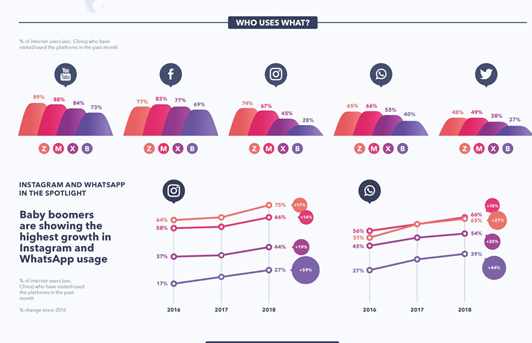In addition to measuring the wide impact and significance of social media in the life of the elderly, we want to imagine the level they can reach in 2030 with new features and improvements.
Today, social media is more than a platform where people communicate with each other.
According to Global Digital Report 2017 (Hootsuide, nd )
- The number of internet users worldwide in 2019 is 4.388 billion, up 9.1% year-on-year.
- The number of social media users worldwide in 2019 is 3.484 billion, up 9% year-on-year.
- The number of mobile phone users in 2019 is 5.112 billion, up 2% year-on-year.

These figures show that the place of the internet in people’s lives has increased and will continue to increase. The use of the Internet increases, due in part to how much time people spend on social media. According to researchers, Facebook is the most popular social media site and it is especially the site preferred by the elderly. According to Pew Research’s most recent social media fact sheet, 69% of adults between 50-64 and 40% of those above 65 use social media. Perhaps more interestingly, 41% of Facebook users are 65+(Pew Research Center, 2019)
As stated in the video above, the older people are actively using the internet. By 2030 they will become more active and experienced users. With reduced mobility, social media will become more attractive to them and will use social media in many areas of their lives.
Ten years ago, we could never have predicted the point we reached today. Online chat rooms, playgroups, live video conferences and more. Imagine 2030 now! While Facebook, Instagram, Snapchat, YouTube and all other social media platforms are constantly renewing themselves, new platforms will be added to our lives and these new platforms will change the habits of the elderly. Seniors will connect with people who share the same tastes and socialize online. Many older people will have a wide social environment even if they are alone. For example, while receiving health information from his doctor, he will be able to send an online gift to his grandson; While planning his vacation, he will vote online for the presidential election.
In 2030, social media seems to cause digitization of the seniors’ habits.
Zeynep
References
Hootsuite. (n.d.). The Global State of Digital in 2019 Report. Retrieved from Hootsuite Web site: https://hootsuite.com/pages/digital-in-2019
Pew Research Center. (2019, June 12). Social Media Fact Sheet. Retrieved from Pew research Center Web site: https://www.pewresearch.org/internet/fact-sheet/social-media/#who-uses-social-media
YouTube. (2018, January 17). Technology & Social Media: Do Seniors Use Them. Retrieved from https://www.youtube.com/watch?v=JvLv8Scc8zI








